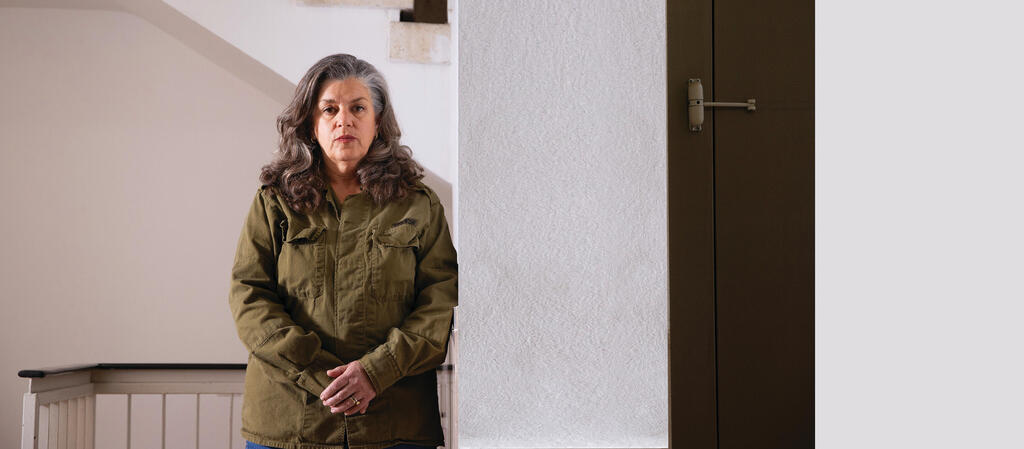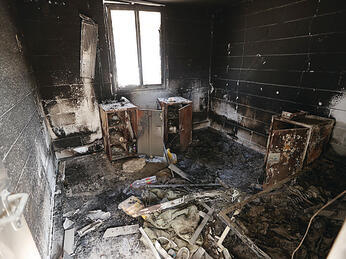Getting your Trinity Audio player ready...
On Simchat Torah, October 7, Shari Mendes and her family were at their home in Jerusalem. "One siren followed another, which is very rare in Jerusalem," she recounted.
"At first, we thought it was a mistake, but soon realized something was happening. We don’t use phones on Shabbat, but once we were updated, I turned on my mobile and received a 'Tzav 8' [emergency call-up order]." Warning: Her account contains descriptions that may be difficult to read.
Mendes is part of a volunteer unit within the Military Rabbinate. "In 2010, the IDF decided, as more women joined combat units, to establish a small female unit for the eventuality, God forbid, that a female soldier is killed,” she shared.
“They accompany the identification process and burial preparations. We are not doctors or forensic experts; among us are lawyers and architects, each with her profession. Many of us are in our 40s, 50s and 60s, and we serve in this unit voluntarily. We are a special and sensitive group of women.”
As part of their duties in the unit, they knew they might have to deal with a mass casualty event, but none of them could have imagined the scenes and the number of bodies that arrived at Camp Shura following the October 7 massacre.
More stories:
"We arrived at the base on Saturday night and were in shock," she described. "The initial shock was from the quantity. Body bags lined both sides of the corridor, whole trucks arrived with more bodies. We couldn't believe the numbers. The second shock was from the level of brutality and horrors we saw."
Since October 7, about 40 IDF female soldiers have arrived at Camp Shura. "All the work with the fallen soldiers who arrived at Camp Shura was done by us," Mendes said.
"We were with those young women in the room preparing them for burial. Our goal was to give them their last respects. We opened the body bags. If they were dressed, and needed their clothes removed, we did it. If they had jewelry that needed to be taken off and cleaned, we did it. We did nothing medical.
“Every time we opened a bag - we made sure the door was closed so no one passing by could see the women unintentionally. It was a special room for women by women. There was a different atmosphere there."
"Their voices were taken from them, and many still had expressions of pain on their faces. I hope their families know how respectfully their daughters were treated."
As time passes, Mendes finds it increasingly difficult to discuss what she witnessed. "Some of the bodies arrived in very poor condition, but we took our time to handle them in a way that honored them. We knew we were likely the last people to be with these women. It was deeply sad; they could have been our daughters, brutally murdered,” she said.
"Their voices were taken from them, and many still had expressions of pain on their faces. Their fists were clenched, their mouths sometimes open, and some were missing body parts. We saw women shot in the head, shot in the torso. It was horrifying to witness. You could tell these women did not die an easy death, and we decided that we, as women, needed to offer them dignity and love in that room. I hope their families know how respectfully their daughters were treated."
Five months later, the horrors do not fade for Mendes. However, what pains her most is the world's denial of the massacre and the atrocities of October 7.
"The most hurtful thing for me is that the world doesn't believe us," she said. "I am a daughter of Holocaust survivors, raised on the testimonies of what happened to most of our family. We trusted in that. The world doubts something we all saw with our own eyes. They say it's a lie, that it didn't happen.
"This denial is a significant trauma for me because I personally believe that victims, especially women who find the courage to speak up, should be believed. If you don't believe a victim, you victimize them a second time.
“These women can't speak; only those of us who saw it can speak for them. I struggle greatly with this. That's why I continue to talk about what happened there, in those days, for them."




